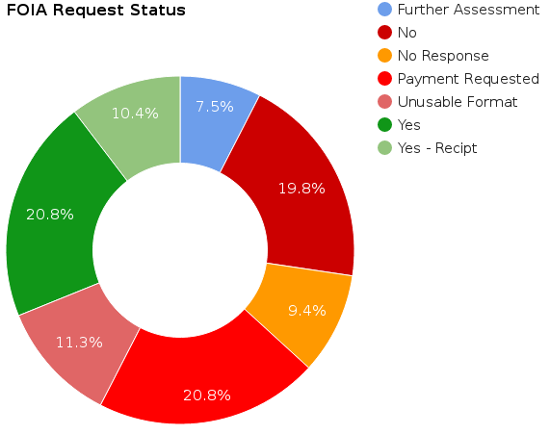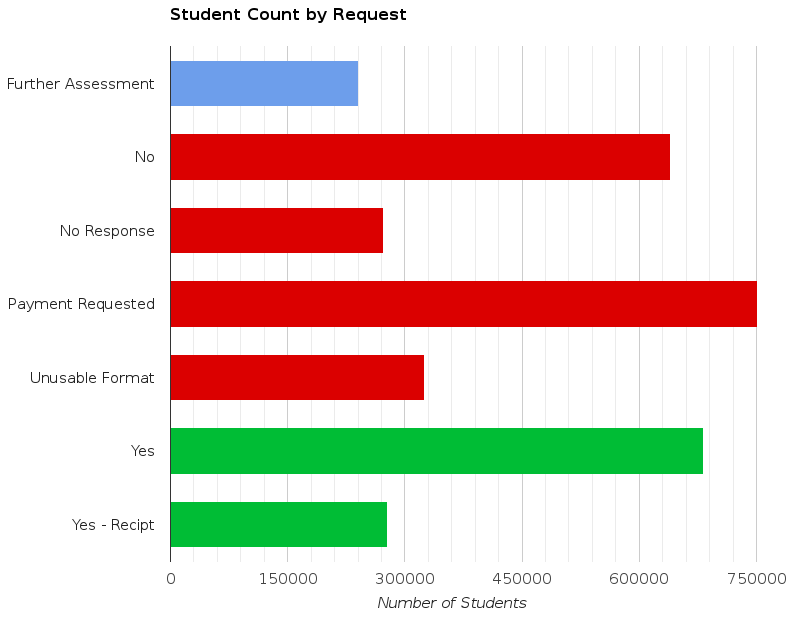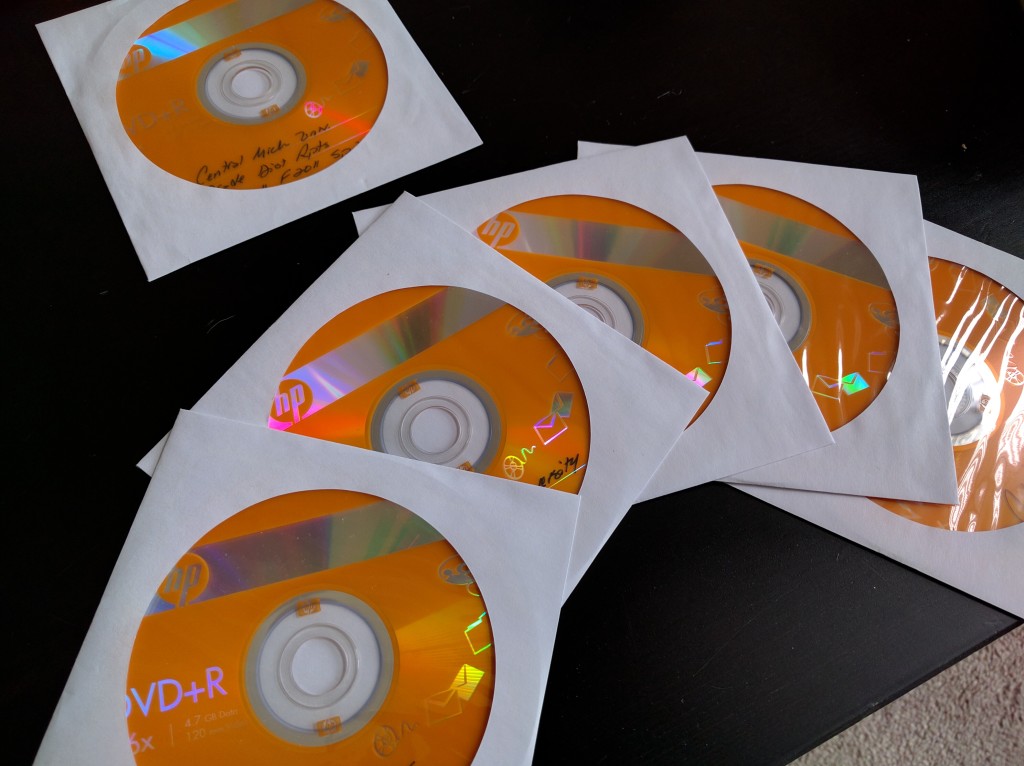Ever wonder what it would be like to request the grade distributions for every semester, course, and professor at a major university? No?
Luckily, you won’t have to. Over the last month, my wife Jennifer and I decided we wanted to get the grade distribution for every university we could using a FOIA requests (template form here)!
We needed these for our new website Easy A, we knew it would be tough, but we were on a mission!
The Good
My wife handled each and every FOIA request to over one hundred universities, and the response was actually better than you may suspect!
- 20.8% of the universities provided us with exactly what we asked for and are either being added or already added to the website.
- 10.4% said they will get back to us, with what we asked for.
- 7.5% sent us something that needs to be assessed in more detail (i.e. CD’s, scrape-able web pages, etc.).
- 19.8% outright denied the FOIA request.
- 11.3% sent us data in unusable formats (PDF’s for example).
- 9.4% never responded, after repeated emails/phone calls.
- 20.8% pay walled us, usually at a reasonable expense.
Although she occasionally had to call the universities, argue back and forth, and cite laws, she managed to get roughly 30% of the universities to provide us with data. This data is what we will call a “positive response,” that is responding with either
The Bad
Unfortunately, there are still a large number of universities that refuse to provide us with what we requested. In fact, roughly 60% of FOIA requested university students go to universities that didn’t positively respond to our FOIA request.
It turns out, only ~750,000 (out of 3,216,494) students attend universities that positively responded to the FOIA requests with the data we asked for. Leaving 77% of students in the dark about information they legally have the right to know….
 If we then look at the median university size by request, we see that large universities were in general less willing to comply with a FOIA request. However, many only had a small (less than $250) payment request, which is reasonable.
If we then look at the median university size by request, we see that large universities were in general less willing to comply with a FOIA request. However, many only had a small (less than $250) payment request, which is reasonable.
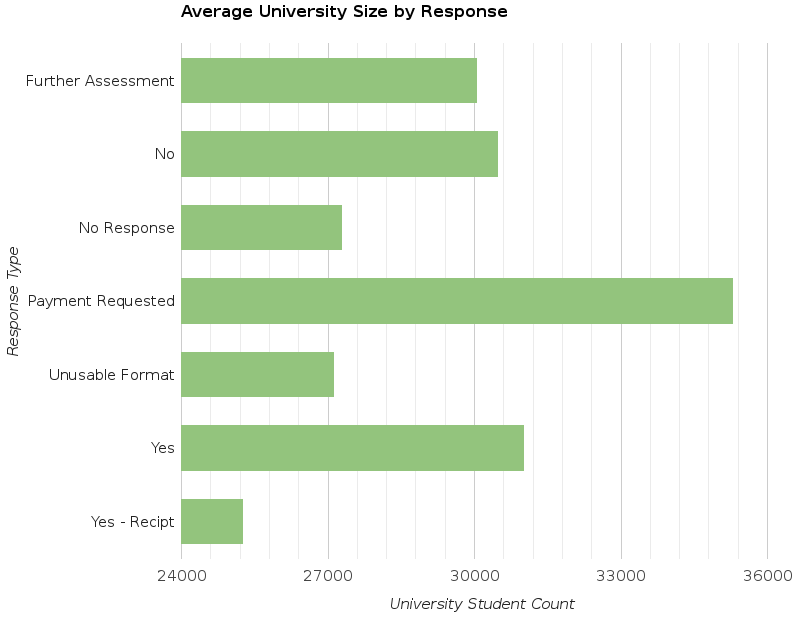 What’s even more interesting is that only a few states requested payment(s) for the FOIA requests. Below is a graph containing the median cost of a FOIA request for a given state.
What’s even more interesting is that only a few states requested payment(s) for the FOIA requests. Below is a graph containing the median cost of a FOIA request for a given state.
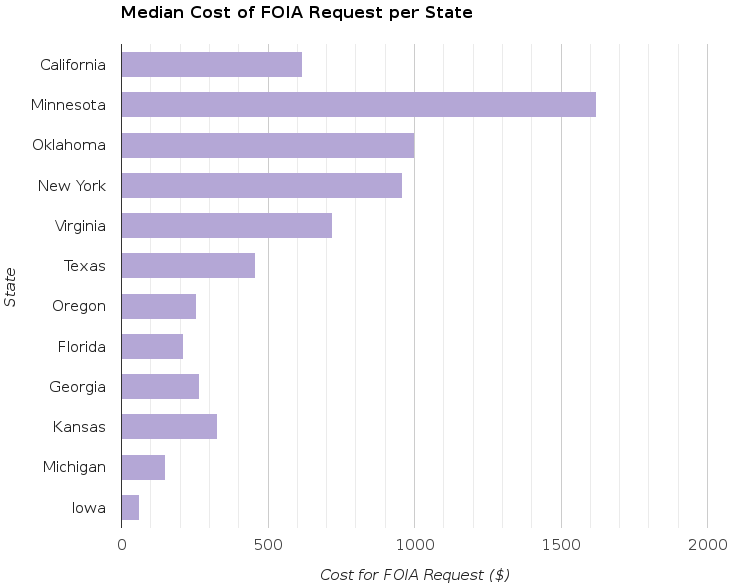 Minnesota is clearly leading the pack based on the median cost, but there was only one university FOIA requested so there is a bit of bias there. What’s more interesting is what states are not on the list. Illinois, for example contained eleven FOIA requested universities and none of them requested payment. To put that in perspective, here are the top 5 FOIA requested states:
Minnesota is clearly leading the pack based on the median cost, but there was only one university FOIA requested so there is a bit of bias there. What’s more interesting is what states are not on the list. Illinois, for example contained eleven FOIA requested universities and none of them requested payment. To put that in perspective, here are the top 5 FOIA requested states:
- California – 16
- Illinois – 11
- Texas – 7
- Virginia – 7
- Florida – 5
If we now look at individual universities, some universities requested a reasonable amount. Reasonable, being less than a few hundred dollars… Then there is University of California Davis and University of Minnesota.
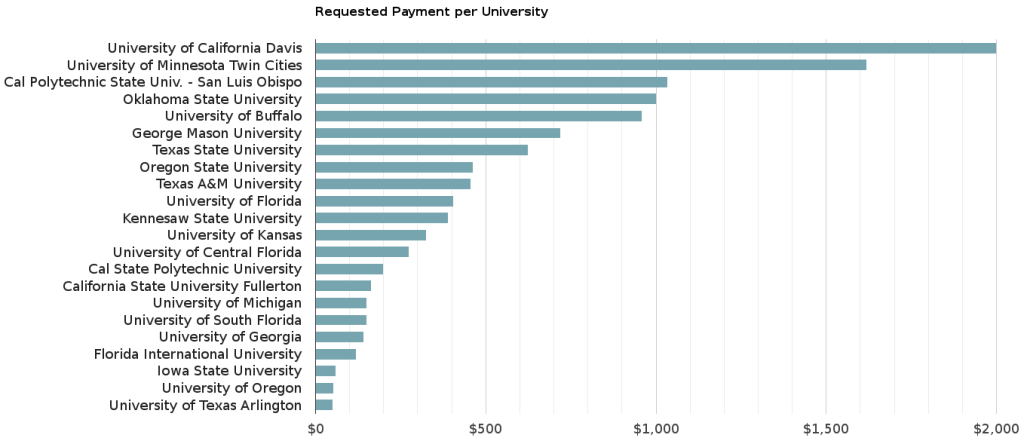 Those are just the universities that requested payments, there were many universities which obfuscated and/or directly denied us.
Those are just the universities that requested payments, there were many universities which obfuscated and/or directly denied us.
The Ugly: Painful University Quotes
Purdue University of example, said they didn’t have those records:
Purdue University does not have such a record in existence. One would have to be created in order to fulfill your request. Indiana’s Access to Public Records Act puts no obligation on a public agency to create a record in order to satisfy a records request. Therefore, Purdue has no records to provide.
– Purdue University
Even when questioned, they responded with:
I have now re-confirmed with our Registrar’s office that Purdue would need to take affirmative steps in response to your request to generate such a document—steps that would require, at a minimum, some level of data processing to create a record that does not exist.
– Purdue University
Kansas State University did the exact same thing:
The information that you are seeking does not exist as a Record, a record would have to be created, and Kansas Open Record Statute does not require records be created in response to an Open Record Request.
– Kansas State University
Even worse, Ohio State University didn’t deny having the data, but they did deny they had to provide the data because the database could not output the information needed…. But then what is the point of the database again?
We have determined that there are no responsive records to your request. More specifically, the data that you are requesting does not exist in any identifiable or retrievable form. The databases utilized by the university are not currently programmed to produce reports that would be responsive to your request.
– Ohio State University
This happens again and again, with universities denying us. However, what is almost worse are the ones that don’t deny us, but will only provide the data in some format that makes no sense. Take University of Utah:
The University of Utah received your GRAMA request dated February 28, 2016. In that request you seek grade distributions for all formal courses at the University of Utah for the last five years. You requested this information in a digital CSV format.
We can only provide a paper format. The report for the last five years is 9,714 pages. The reasonable copying fee for documents responsive to most GRAMA requests is $.25 per copy. Therefore, your cost for this report will be $2,428.50.
– University of Utah
It seems that their goal, was to create an unreasonably high barrier to getting the data; which indeed worked.
The Really Ugly
Some universities even sent us data on CD’s, although that’s better than nothing, it boggles the mind as to why they couldn’t just email 5Mb files.
Comically, Central Michigan University not only sent us CD’s, but they needed a different CD for every year, which was only a few megabytes of data.
What makes it all the more humorous, is that they forgot a semester so they sent another CD…
The second CD actually contained five semesters, where the first only contained one or two each…
Although, I do have to give them credit, at least they completed the request!
Summary
Thankfully, all the universities are not nearly that bad.
For example, Indiana University of example has it right on their webpage, or University of Illinois responded almost immediately in 2015, with exactly what was requested!
Of the universities we sent a FOIA request to the following are the exemplory ones. Each of these universities positively responded, or did not require a FOIA request at all:
- Indiana University Bloomington
- University of Illinois Urbana-Champaign
- University of Washington Seattle
- University of California Los Angeles
- University of Houston
- University of California Berkeley
- Texas Tech University
- North Carolina State Raleigh
- Virginia Tech
- Kent State University
- University of Kentucky
- West Virginia University
- University of Illinois Chicago
- James Madison University
- Florida State University
- University of Colorado Boulder
- Liberty University
- University of Virginia
- Grand Valley University
- University of North Carolina Charlotte
- Central Michigan University
- Illinois State University
For a full list, we kept a nice Google Spreadsheet containing all the status, as well as links to our Dropbox containing all the relevant FOIA requested documents.
Continue reading this series…
- Don’t be a fool, FOIA your school – Previous Post
- Lessons Learned FOIA Requesting Over One Hundred Universities
- Easy A: Alpha to Beta – Next Post


